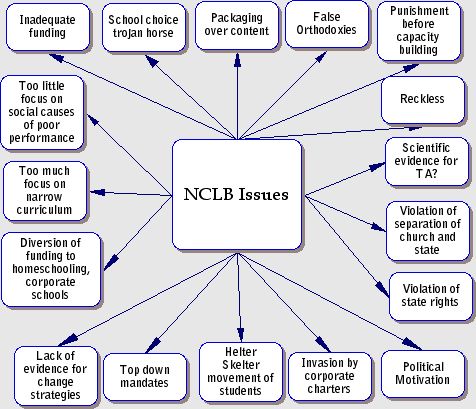Marie Griffith of the
CATO Institute writes this is her webpage
Reason Online. This is interesting. She lists, and we agree, many of the reasons why NCLB should be resisted. Talking about Margaret Spellings Education secretary she writes,
" ...Spellings employs a mixture of honey and vinegar in her negotiations with states. On one hand, she has promised "
flexibility" in the implementation of the No Child Left Behind Act. But she will not waive its intensely prescriptive testing provisions. For example, too many special education students must take exams inappropriate to their needs. Moreover, she cannot change the faulty basic structure of a law that purports to let states create accountability regimens, but micromanages every step of that process..."
We agree.
"On the other hand, Spellings engages NCLB critics in
fierce public relations battles. Spellings called Connecticut officials "
un-American" for daring to suggest that some No Child regulations fit poorly with Connecticut's own accountability plan.
If a state complains about NCLB's endless red tape, Spellings' staff will search through hundreds of statistics to find the handful that paint the state in the worst possible light. These will find their way into ghostwritten op-eds in national publications. If a state asks for waivers of prescriptive guidelines that undermine state-level accountability systems, Spellings implies that the state does not care about its children's education..."
Sounds about right to us but wait there's something else,
"That states like Utah are resisting such carrots and sticks is inspiring, and may signal a sea change in the relationship between the federal and state governments when it comes to money and influence.
For half a century the federal government has used the power of the pocketbook, and the ability to borrow lavishly, to homogenize state policies about everything from schools to highways. The long run result is seldom better policy, because supplanting many state experiments with a single system thwarts the innovation that leads to improvement.
Often, state governments do not care because they have an incentive to maximize their budgets, not their effectiveness. For example, a federal law may provide 10 percent more funding in return for following regulations that will require the entire 10 percent to be spent on staff dedicated to filling out compliance forms.
In the real world, people would dismiss such a program as a waste of resources. But in government, such laws are welcome because they create additional jobs for state bureaucrats. Union leaders love this system because it benefits their members, and politicians love it because it benefits the unions. The fact that nothing productive is actually accomplished is beside the point.
By passing HB 1001, which prioritizes state educational goals at the risk of losing federal dollars, Utah has made the bold claim that education is too important for business as usual. Utah has concluded that its state accountability system best serves students, and has decided to pay more attention to how well children learn than to how many government jobs get created..."
Oh, we see it's too much big government. Now that makes sense from a conservative perspective. It has always amazed me that my conservative state of Alaska has not complained more about this big government interference. But wait theres more,
"... if the federal department does get tough, Utah should stand firm. States will never win the right to manage their own affairs as long as they remain addicted to federal dollars. If Utah shows that it is financially and politically possible to shrug off federal interference, other states may do the same. Both children and taxpayers would benefit from their courage."
Coincidently, or perhaps not this editorial from the Pittsburgh Tribune/Review also showed up on the internet today.
"It's hardly surprising that No Child Left Behind has been targeted by insatiable public school spendthrifts who continually demand more but accomplish less.
The National Education Association, along with nine school districts, have filed a lawsuit arguing that President Bush's centerpiece for better schools is underfunded. The cure? Congress must boost current spending from $12.7 billion this year to $28 billion.
We'll wager even that won't be enough. No amount of taxpayer conscription will fill the belly of the beast that has grown larger, not smaller, under Mr. Bush.
That's because the president's education initiative only adds another layer to an unresponsive bureaucracy. What's needed is reform.
Step one is to seal up the money pit that is today's federal Department of Education. Bush's initiative is more appropriately dubbed No Taxpayer Pocket Left Unpicked. The administration, in a sop to Teddy Kennedy, has boosted the federal Education budget by 40 percent.
Step two is school choice. Despite court victories, choice has moved with glacial speed -- if any. Those who endorse No Child Left Behind say full-scale school choice isn't achievable. It would be if those who pay lip service to better schools took up the fight.
Simply throwing more money at the problem won't achieve accountability from a system unwilling to change. Giving parents a choice will require poorly performing schools to meet public expectations -- or face extinction."
Now I get it. Stop spending money on public education and highways, and give parents a choice.
But I wonder should the feds still continue to fund the voucher movement?
Anyway it appears that some conservatives don't like NCLB any more the we and that may be a good thing as far as getting rid of or changing the law goes but I am getting a little worried about what might come next.


